9 Possible Re-Definitions of the Word “Nerd” for the Modern Age
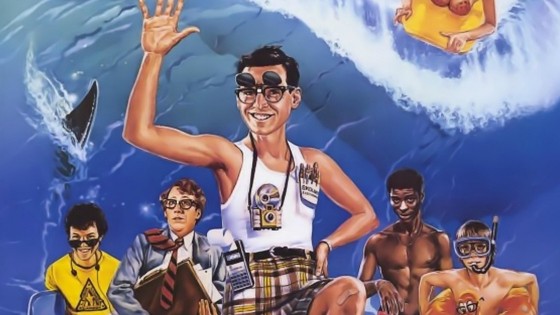 |
I’m perhaps the 10,000th person to observe this, but it bears repeating: The definition of “nerd” has, in the last 20 years, changed dramatically, perhaps even losing its meaning altogether.
I went to high school in the mid 1990s. At that time, my interests earned me scorn from most people. I enjoyed betting together with friends to play Dungeons & Dragons at lunch, had extensive conversations about Star Trek: The Next Generation, and I voraciously read superhero comics. I was a teenager, but I was still eager to watch Saturday morning cartoon shows. I was heavily involved in my school drama program. I played the flute. My favorite records were Broadway showtunes, “Weird Al” Yankovic albums, and anything that was played on The Dr. Demento Show. In addition to all this, I was a noisy, awkward, chubby weirdo. I doodled a lot and made bad jokes to anyone who would listen. I was a virgin. I was, by the parlance of the time, a nerd.
To encapsulate history into a very brief overview: “Nerd” was, at the time, a pejorative through-and-through. In 1995, no one – NO ONE – would say something like “I’m a nerd, and I don’t care!” Nerd interests were not the mainstream yet. But then the Internet happened, nerd interests began growing from underground communities into mainstream markets, and about a decade later, “nerd” would be everywhere. Now video games make more money than music, superhero movies make more money than any other kind of movie, and every single person in America is equipped with some piece of complex consumer electronics that is no longer esoteric. Nerd has gone mainstream.
“Nerd” once implied an outsider status. Now, the word’s very definition has been scattered, reclaimed, redefined, reused, and scattered again, left aching in a vague and broad pile of multiple meanings. Let’s look at where culture stands right now – as we live in The Age of the Nerd – and see what the word really means. Here are nine possible definitions.
1. Nerd. n. Socially Awkward Intellectual
 |
This classic definition of “nerd” still lingers in the public consciousness. We all had kids like this in our high school classes (or perhaps were that kid). The one who had a particularly strong aptitude for the sciences, physics, astronomy, or even poetry or theater, but who could never communicate with any of their peers with any sort of grace. This type of nerd can still wax at length about their chosen field of interest, but cannot – simply cannot – communicate beyond that. It is here that we find the classical nerd image. The glasses-wearing, poorly dressed heavy breather who is constantly reading.
And while a lot of more modern-day nerds (who perhaps fit one of the definitions below) have tried to “take back” this popular definition, I have a feeling that this is the one that still does – and perhaps always will – linger over the culture. Nerds – to at least a small degree – will always be considered intellectuals, and they will always be considered at least the smallest bit socially awkward.
To cite the actual etymology of the word “nerd,” it first appeared in the Dr. Seuss book If I Ran the Zoo, which was published in 1950. A story I have heard is that the word is an abbreviation of the word “knurd,” which is “drunk” backwards. A knurd is one that does not drink and is, hence, something of an unpopular square. The popular image of the glasses-wearing intellectual nerd first started leaking into the pop consciousness in the 1970s, and was cemented by the time Revenge of the Nerds came out in 1984.
I will now begin the campaign to retake the “knurd” spelling.
2. Nerd. n. Enthusiast of All Popular Things
 |
“Nerd” interests were once more closely associated with the definition above. Nerds were specifically into science, sci-fi, comic books, electronics, RPGs, and other more esoteric things like ham radio. The interests that a nerd held were typically outr?, odd, and unpopular (yes, dear readers, there was a time when comic books were dismissed by just about everyone as immature kiddie fare not worth a second glance). Since early nerds couldn’t communicate outside of their interests, they had to express their emotions and their passions through things like sci-fi and RPGs.
This is perhaps the most commonly used definition of “nerd” in the modern idiom. It is essentially now used to describe anyone who has passion for just about any specific thing, especially if it’s really popular. People use the word “nerd” to describe that they really like the ultra-popular Marvel movies, for instance, calling themselves Marvel nerds. But it doesn’t stop there. People are also Game of Thrones nerds. Or TV nerds in general. Or movie nerds. Or sports nerds. Or opera nerds. Or Stephen King nerds. Or race car nerds. Or Disney Princess nerds. Or fantasy football nerds. Or sandwich nerds. These days, getting excited about, well, anything, allows you to call yourself a nerd.
This definition of nerd relates, then, to the self-perceived passion one holds for a particular thing. Although, by this definition, outright passion is not a requisite; one often uses the word “nerd” merely to imply that they have more than a passing interest in – or mere passing knowledge of – a popular thing. If one has a thumb on the pulse of popular culture, this new definition of nerd is applicable.
Think of something that you can’t be a nerd about. Is there even something? Also, how many people attend Comic-Con these days?
3. Nerd. n. Enthusiast of Children’s Entertainment
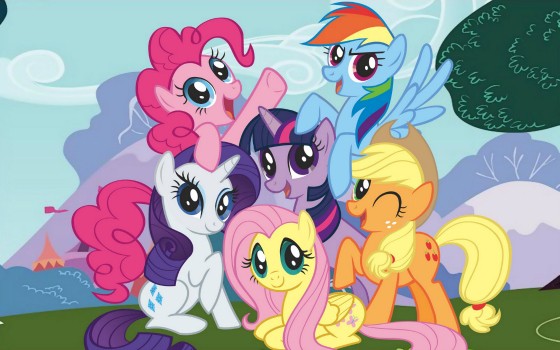 |
And while the above definition casts a wide net over all of popular culture (or even culture in general), I think we all vaguely understand that “nerd” interests are still within a a very specific purview. If you’re into comics, video games, genre movies, certain types of TV shows, or other related indicia, then you, sir, can say you have “nerdy” interests. I think we can all rattle off movie or TV titles that are considered quintessential nerd titles. Start with Star Wars, and work your way down.
But where are the boundaries of pop nerddom? I’ve tried to tie together what separates something nerdy from something that is not nerdy, and tried to see what all the nerdy things have in common. I have come to the following conclusion: Nerdy things are, for the most part, for kids. Nerd shows, nerd movies, nerd hobbies, and nerd properties are all leavened by a definite element of childlike fantasy. Even if a nerd property is dealing with complex adult feelings, real-life adult concerns, or high-minded adult philosophies, they are still going to be couched safely within a somewhat childish fantasy conceit for easier consumption. It’s the spoonful of sugar to help the medicine go down. When Spike Lee makes a film about racism, that’s not nerdy. It’s hard and harsh and confrontational. When Gene Roddenberry makes a sci-fi metaphor about racism, it is nerdy. It’s involved in its own imaginary mythos first and a story of racism second.
Sure, plenty of nerdy stuff is soaked in blood and sex and other things little kids would not be interested in. But the fantasy element in all nerd properties sands the edges off, lending a definite childlike tone to even the most serious and adult superhero/sci-fi/zombie stories. Young nerds like their kid stuff. Adult nerds like that same kid stuff, just more violent.
Ask a Brony about this one.
4. Nerd. n. Arrested Adolescent
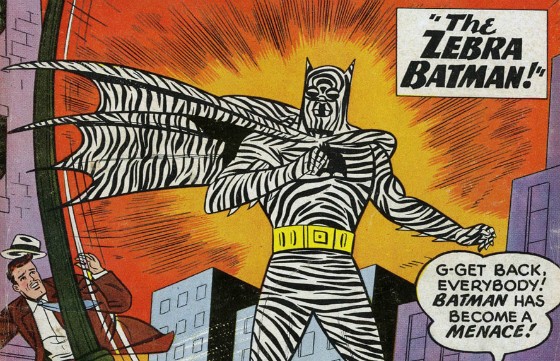 |
This definition of nerd is perhaps one of the only pejoratives still actively associated with the word. If a nerd is someone who is passionate about kid-friendly entertainments – i.e., they are an adult who still reads comic books, plays video games, and watches genre films exclusively – then they must also be somehow arrested in their own adolescence somewhere. They found their niche in high school, and they never left.
Now this is not necessarily a bad thing for most people. I personally belong to that weird lost generation in between Generation X and the Millennials (I’ve always thought myself to be Generation Y), and my generation was essentially the first generation to be encouraged to cling onto their childhood things as they grew up. There’s no reason to put down video games, 20-year-old. You don’t need to become an adult all the way. Now you can have sex and drink, but also toys and video games! There is now not only a cultural tolerance for arrested adolescence, but an active encouragement of it. If you’re afraid of adult responsibilities, you can soften the blow by having your old toys around you at all times.
And while many celebrate this cultural shift, there is an air of stagnation about it. I would never encourage someone to stop liking RoboCop (except for that one time when I did), but I would perhaps also encourage people to read old books, listen to old music, and try to constantly expand their cultural horizons. Nerds tend to stay within their adolescent interests. Sure, comics can be high art, but so can high art.
Eschew comic books for old novels, and see how far you get socially.
5. Nerd. n. Bully
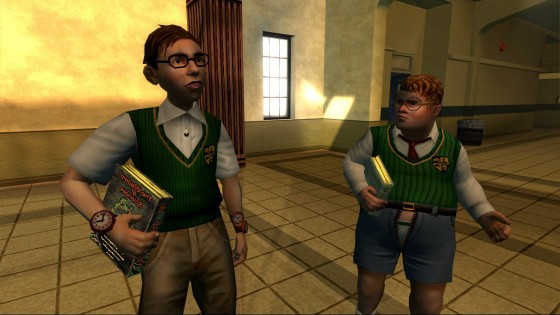 |
As someone who has dared to say they were merely warm on films like The Avengers, or simply didn’t care for Pacific Rim, I have repeatedly and violently encountered a new definition of nerd that seems to have crept into the center of nerd consciousness: That of the bully. There was a time when “bully” was an antonym for “nerd.” As popular tastes have changed, nerds have become bullies. A few minutes on any nerd forum site will reveal this. There was a time when you would get violently shoved into a row of lockers because you once said out loud that you read comic books. Now you will be harassed, insulted, derided, and dismissed if you don’t like comic books.
I don’t see why this has occurred. Nerddom used to be couched in a shared crucible of surviving bullies and unpopularity. Nerds would gather together to share interests because the bulk of people didn’t share those interests. It about about collecting outsiders together. Nerd culture has now, however, been so sharply defined that everything has inverted. Now the popular stuff is the nerd stuff. And if you don’t like the nerd stuff, screw you. Die in a fire. Every comic book movies is great and you’re a dumb, contrarian, over-analytical hater if you feel otherwise.
True, this definition can only be applied to a certain small segment of Internet-dwelling nerds who populate hate-mongering websites like 4Chan, and who leave angry comments on YouTube videos. But when a nerd interest like video games can somehow blossom into something as talked-about and as vitriolic as GamerGate, then you can see that nerds have not only become bullies, but really awful bullies.
I await the first recorded case of a bunch of X-Men fans pushing over and taking the lunch money of a basketball player who doesn’t like X-Men.
6. Nerd. adj. Cool, Savvy, Sexy, and Accepted
 |
I once read an interview with actress Jessica Alba. She declared in that interview that she was always a big nerd, and that she was very good at math in high school. I accept that she was very good at math in high school, but I don’t buy for a second that she was a nerd. Not a nerd as it was defined in the first definition anyway. There’s no way that someone as charming and as beautiful as Alba would be picked on for her math skills, or that she would be bullied for her bizarre interests. “Nerd” has become such an inextricable part of the current American pop ethos, that even hip people describe themselves that way.
Indeed, calling yourself a nerd is a badge of honor by this definition. Using the adjective “nerd” to describe yourself, you are declaring that you’re hip. You’re with it. You know what the kids are into, and you can speak their lingo. You can talk just as smartly about Batman as your own 15-year-old son. By this definition, a nerd is someone who is cool. Someone who is popular and loved. Someone who is socially graceful. And, given the number of fetish websites devoted to “sexy nerds,” good looking.
Indeed, a lot of people who call themselves “nerds,” are wealthy entrepreneurs with business empires at their fingertips. Someone like Mark Zuckerberg comes to mind. Or Chris Hardwick, a handsome, funny, rich, well-dressed TV personality who drives expensive cars and dates models, and still calls himself a nerd.
Full disclosure: I once worked for Nerdist Industries, and I was fired. It was for various reasons. I assure you I’m not bitter toward Hardwick or anyone else.
7. Nerd. adj. Angry and Opinionated
 |
This ties in closely to definition #5, but with less desire to do harm to others. Indeed, this definition of nerd is more about how nerds move around online than they do in the physical world.
If you are a nerd, how do you express yourself to other nerds? It’s not going to necessarily in D&D powwows or in debate class. It’s going to be online. Much of nerd culture tends to dredge through that most dangerous of all socials arenas: The Internet Forum. I don’t think any Internet forum (at least in my limited experience of them) is about joy or positivity or sharing funny stories. They are used as places of argument. Or insult. Or bickering. The only place where forum members tend to regularly get along is on pornography sharing websites. Masturbation will bring us closer together than the PlayStation 4.
In a few of the above definitions, I have alluded to passion as being a defining characteristic of the modern nerd. But just as some say that true love cannot exist without jealousy and suspicion, true nerd passion cannot exist without defensiveness, derision, and argumentative immaturity. In order to prove yourself a true nerd, you can’t just defend something you love. You have to get OUTRAGED about it. You’re not a nerd unless your mad about something. Mad about the way critics treated your favorite movie. Mad about the way the studios got your favorite character from the novel completely wrong. Mad about how your favorite movie was misinterpreted by most people. If your opinions define you (as they do on Internet forums), then your anger will be your sword and your shield. It’s the only way to be a nerd.
It’s a mad, mad, mad, mad nerd.
8. Nerd. adj. Authentic
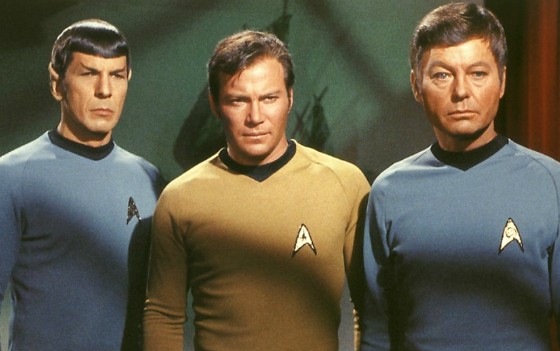 |
Punk rock was once about defiance, subversion, rejection. It was about destroying the status quo. And what happens when punk sells out? When mainstream artists begin dressing like punks, even if they don’t preach the punk rock message of anarchy anymore? What happens to punk then? It ceases to be punk. Sure, the fashion is there, but the attitude – the truth of the matter – seems to be gone.
The same can indeed be said of nerd. There must be plenty of older nerds in the world who resent the “mainstreaming” of nerd culture. Nerd culture, after all, originally took its strength and its definition from that shared crucible of bullying. It was their very outsider nature that made nerd interests so alluring for so many nerds. It was something the rest of the world didn’t have. It was theirs.
As such, there has been something of a gentle schism between the neo-nerds of the modern age, and the old-world nerds who remember way back when. There is a sense that “nerd” should refer to the “true” nerd interests, and not to the piddly, wussy mainstream nerd interests. A real nerd is an authentic socially awkward intellectual. They’re not hip. They don’t need to be. They are the ones who collect old Conan comics, still play the original version of D&D, and carry the torch of the previous generation. The people who handmade the freak flags that you so absent-mindedly fly, you young whippersnappers.
A Trekker denies their true nature. A Trekkie knows what’s what.
9. Nerd. n. Elitist
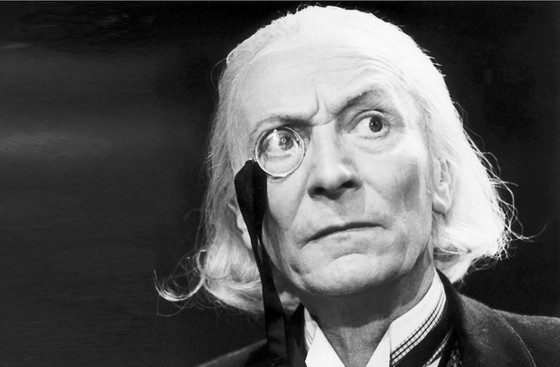 |
Of course, with the above definition comes a further definition; that of the nerd elitist. If one accepts that there are “true” nerds and “false” nerds – and since so much bullying and anger can be mixed in with nerd definitions – one must eventually begin to make argumentative declarations of their own authenticity to ensure their own nerd status. And, as such, we have a definition of nerd that implies directly that arrogant self-righteousness. Indeed, one can easily see how that nerd self-righteousness can be spun into a form of exclusion. Nerd, then, is kind of a cult, and you have to know the right handshake to get in.
I have friends, for instance, who are big fans of an obscure British TV series called Doctor Who. This is a show that has been running – with a few hiatuses – for many decades. Some of my friends began watching when the show was rebooted in 2005. Others were fans since childhood. None of them are old enough to have begun watching at its inception. There is a definite sense amongst the fans that some Whovians are better than others. Whoever you ask, you will get an opinion as to what the real Doctor Who was, which actor represented the true nature of the show, and that a particular kind of Whovian is correct. As such, certain people can’t be true Whovians, because they’re not playing by the rules.
To extend the notion further, is someone a Trekkie if they’ve only seen the last two Star Trek feature films, even if they’re obsessive nerds about them?
A true nerd has to be exclusionary by this definition. They have to be an elitist. They have to, in their own minds at least, possess the true definition of what makes someone a nerd, and they have to judge others as to whether or not they pass muster. The elitism can take the form of hard-worded exclusion, or mere playful insults, but either way, there is going to be a sense that the nerd is right.
As for the definitions on this list, no one is more right than me.
Previously by Witney Seibold:
The 10 Greatest Pinball Machines of All Time
Your New Sci-Fi Heroine: Ruby, The Galactic Gumshoe
